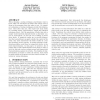Free Online Productivity Tools
i2Speak
i2Symbol
i2OCR
iTex2Img
iWeb2Print
iWeb2Shot
i2Type
iPdf2Split
iPdf2Merge
i2Bopomofo
i2Arabic
i2Style
i2Image
i2PDF
iLatex2Rtf
Sci2ools
SOQUA
2007
2007
Faults' context matters
When choosing a testing technique, practitioners want to know which one will detect the faults that matter most to them in the programs that they plan to test. Do empirical evaluations of testing techniques provide this information? More often than not, they report how many faults in a carefully chosen “representative” sample the evaluated techniques detect. But the population of faults that such a sample would represent depends heavily on the faults’ context or environment—as does the cost of failing to detect those faults. If empirical studies are to provide information that a practitioner can apply outside the context of the study, they must characterize the faults studied in a way that translates across contexts. A testing technique’s faultdetecting abilities could then be interpreted relative to the fault characterization. In this paper, we present a list of criteria that a fault characterization must meet in order to be fit for this task, and we evaluate several well-...
Related Content
| Added | 07 Nov 2010 |
| Updated | 07 Nov 2010 |
| Type | Conference |
| Year | 2007 |
| Where | SOQUA |
| Authors | Jaymie Strecker, Atif M. Memon |
Comments (0)

